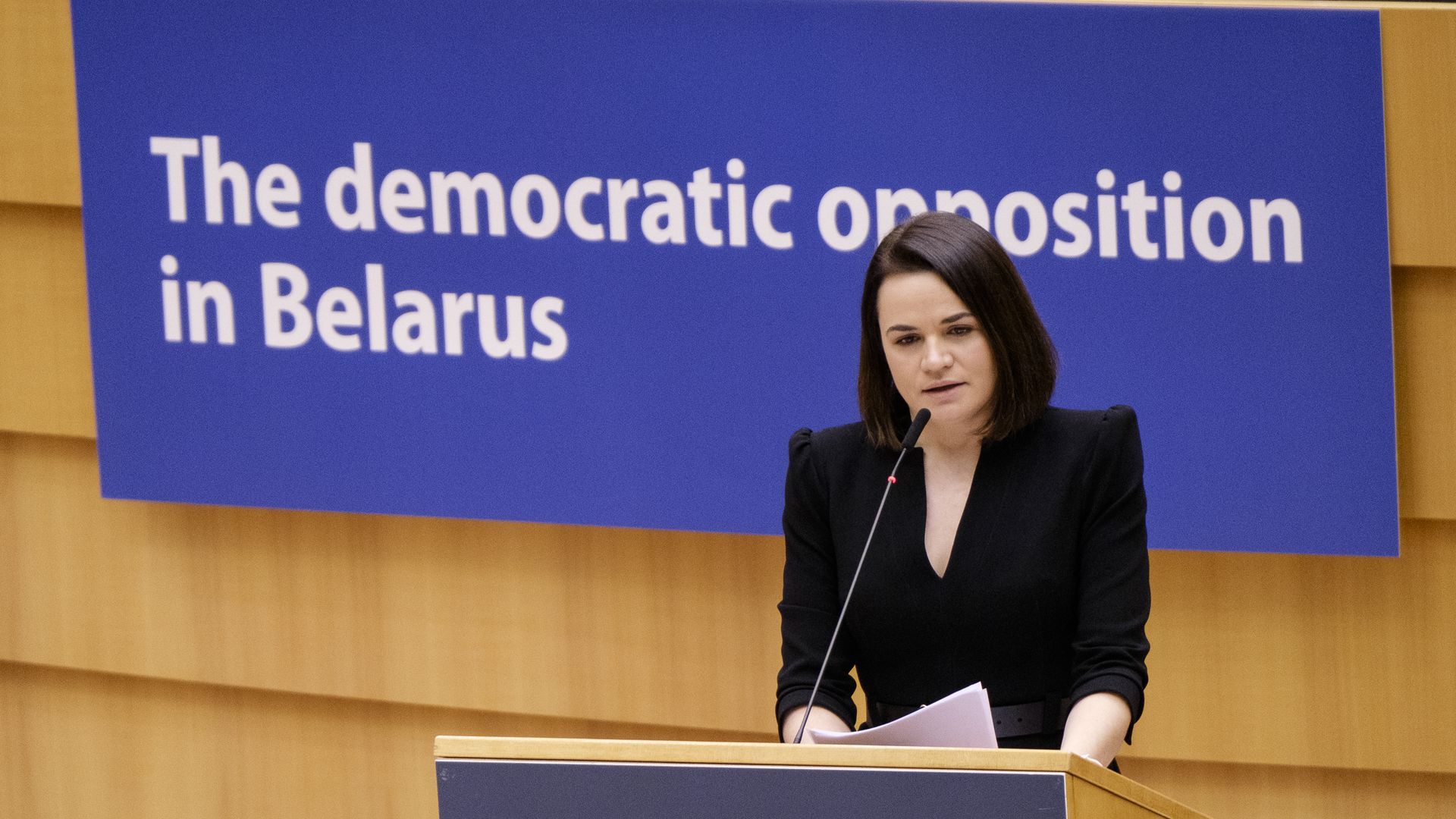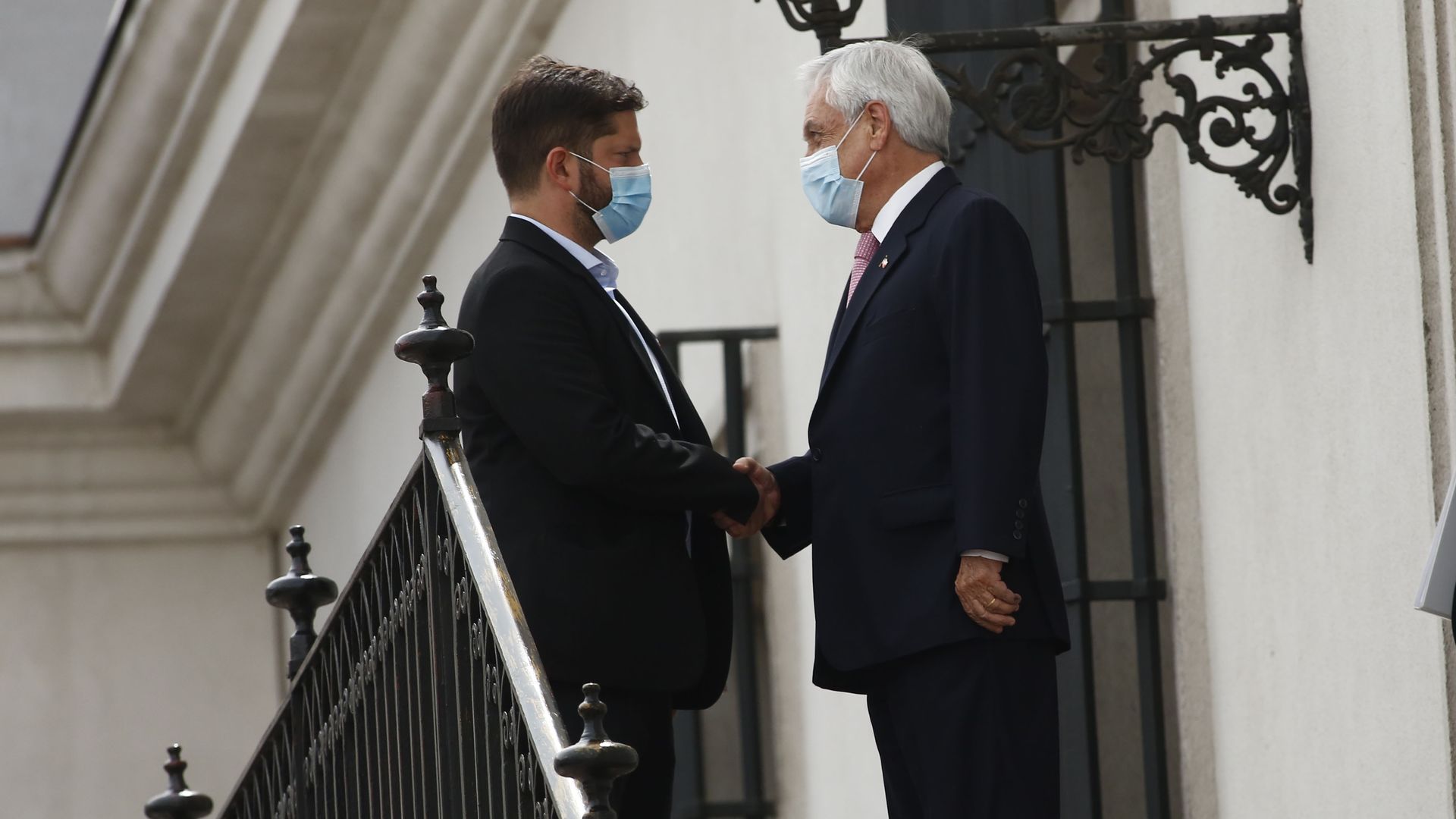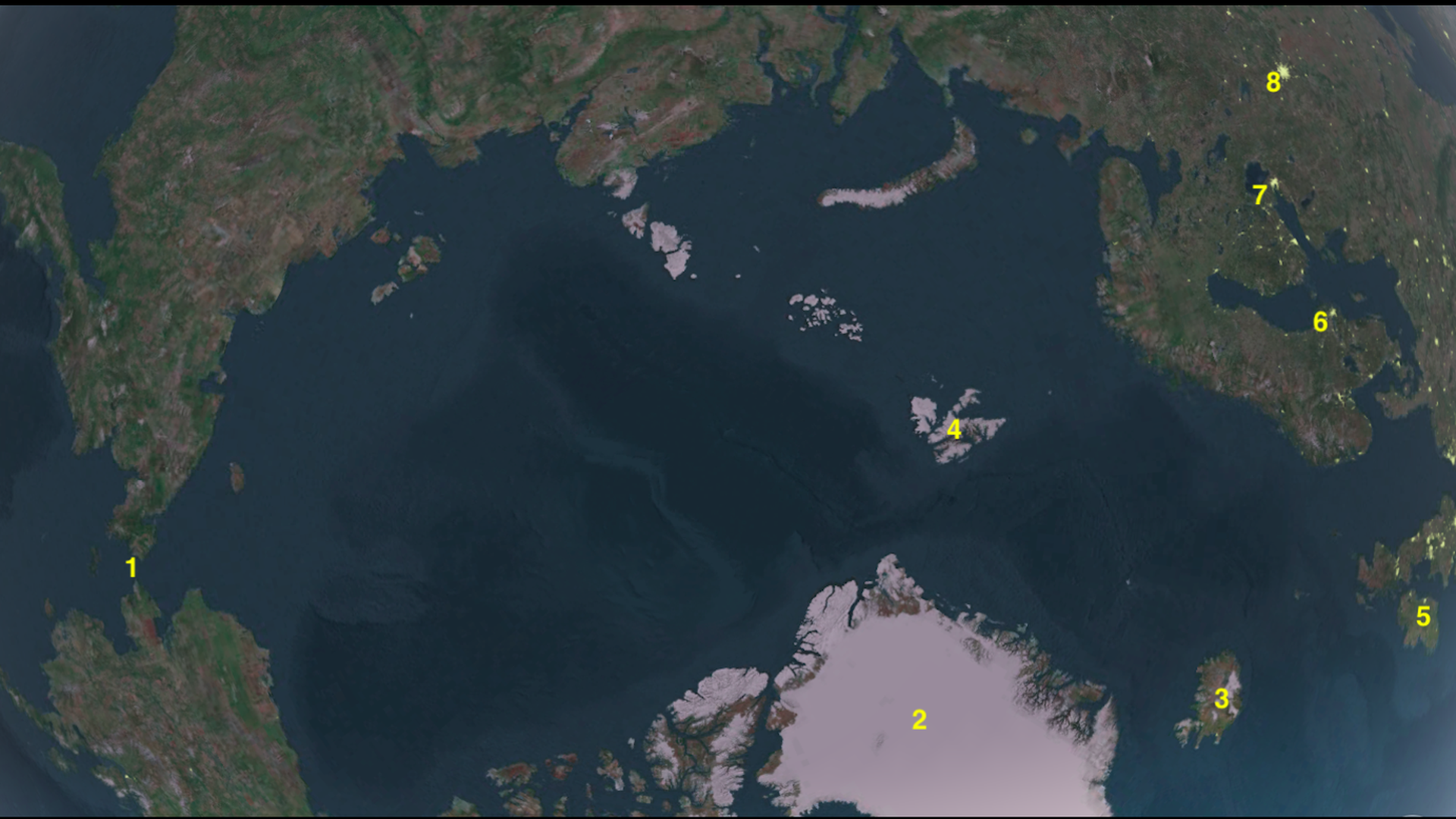| | | | | | | | | | | Axios World | | By Dave Lawler ·Dec 20, 2021 | | Welcome to this year's final edition of Axios World. - We'll be back and better than ever two weeks from today after a holiday break.
- I hope your holiday season is going better than Boris Johnson's. That's where we start tonight (1,718 words, 6½ minutes).
New arrival? Subscribe. | | | | | | 1 big thing: From life of the party to liability |  | | | Johnson enjoys a trip to a police station today. Photo: Leon Neal/Getty Images | | | | Until recently, U.K. Prime Minister Boris Johnson's popularity within his party and with the public made his position appear almost invulnerable. Now 6 in 10 Brits think he'll be out of a job by the end of next year. By the numbers: Johnson's approval ratings have plummeted to a record-low 30%, his Brexit negotiator just abandoned ship, and his image as an electoral juggernaut has been tainted. How it happened: Johnson has faced relentless headlines since early November about "sleaze" in his party ranks (he moved to change ethics rules in an ill-fated attempt to save scandal-tainted Brexiteer MP Owen Paterson) and his own home (he used an undeclared donation to refurbish 10 Downing Street). - He's faced brutal press coverage for matters trivial (the bizarre speech in which he lost his place and rambled about Peppa Pig) and substantial (the resignation of Brexit Minister David Frost over the direction of Johnson's government).
- On COVID, he's tried to walk a tightrope between scientific advisers pushing a stronger response to the Omicron wave and Conservative backbenchers resisting any such steps — 100 of whom rebelled against Johnson in last week's vote to require COVID passes to enter certain large venues.
Then there are the parties, or "work meetings," depending on whom you ask. - Johnson denied an initial wave of reports about Christmas parties in Downing Street during last year's strict lockdown. Then came a leaked video of his spokesperson joking about just such a party at the time.
- Johnson tasked Cabinet Secretary Simon Case with investigating whether any such parties had taken place, but Case stepped down after it emerged that his office might have hosted one.
On Sunday, the Guardian published a photo, taken during another strict lockdown in May 2020, of Johnson seated with his wife and aides in the Downing Street garden, with wine and cheese on the table and a dozen more aides gathered in the background. - Johnson insists the photo shows "people at work talking about work." Deputy Prime Minister Dominic Raab bolstered his own claim of a work meeting by noting that the people in the photo were wearing suits (most of them weren't).
The big picture: Johnson's political allies have forgiven him all manner of sins in the past because he's a proven election winner. - Since London started directly electing mayors in 2000, Johnson is the only Conservative to win. He did it twice.
- Johnson led the underdog pro-Brexit campaign, cruised through the 2019 Conservative leadership election, and then won the party's biggest general election landslide in three decades.
- But when Paterson's seat was up for a special election on Thursday, the Conservative candidate was badgered with questions about Johnson's integrity (which he declined to answer). The Conservatives lost a seat they had held for 200 years, and the party's former electoral savior began to look like a liability.
State of play: Labour currently leads the Conservatives in the polls for the first time since Johnson became Tory leader, but an election isn't due until 2024. - If Johnson is indeed to be ousted in 2022, the shove will have to come from within his own party. Imminent action on that front seems unlikely, though Conservative MPs have started knifing Johnson anonymously in the press.
|     | | | | | | 2. Belarus opposition leader: Fight goes on after husband's sentencing |  | | | Sviatlana Tsikhanouskaya. Photo: Thierry Monasse/Getty Images | | | | Sviatlana Tsikhanouskaya, the exiled opposition leader of Belarus, was in a meeting with Western ambassadors to the EU last week when she learned that her husband had been sentenced to 18 years in prison for his activism. What she's saying: "It was very emotionally difficult to accept, but it didn't change anything in our movement," Tsikhanouskaya told Axios' Zach Basu in a Zoom interview from Vilnius, Lithuania. She fled there last year after Aleksandr Lukashenko's regime began rounding up opposition leaders. - "It was difficult emotionally to cope, but that day I did a lot of interviews and lived through this time after time after time. But I didn't cry. It was like emptiness inside."
The big picture: Tsikhanouskaya has spent the last year meeting with countless government officials — including President Biden — to urge them not to forget the people fighting for democracy in Belarus. - Lukashenko saw his iron grip on power shaken for the first time in three decades last August, when mass protests erupted after he claimed to have defeated Tsikhanouskaya by an implausible 70% in the 2020 presidential election.
Flashback: Two years ago, Tsikhanouskaya was an English teacher, her husband was a blogger, and Secretary of State Mike Pompeo was meeting personally with Lukashenko to try to build a wedge between Minsk and Moscow. - Today, Tsikhanouskaya is the face of the democratic opposition, her husband is a political prisoner, and Lukashenko is a pariah waging a "hybrid war" against the West.
"You can't choose between that and this," Tsikhanouskaya responded when asked whether she ever wishes she could return to her former life. - "I want normal life with my husband, but in a democratic country."
Read the full story. |     | | | | | | 3. A good moment for democracy |  | | | Boric (left) meets today with outgoing President Piñera. Photo: Marcelo Hernandez/Getty images | | | | As it became clear last night that left-wing congressman Gabriel Boric had won Chile's election, a sequence of commonplace events took place that felt fairly remarkable given the hostility of the race and the recent global context. Driving the news: Far-right candidate José Antonio Kast quickly conceded, tweeting a pledge of "respect and constructive collaboration" just an hour after the polls closed. Next, outgoing President Sebastián Piñera, a conservative who is reviled by the left, made a joint TV appearance with the president-elect. - Boric promised unity — "I am going to be the president of all Chileans" — and Piñera offered his government's full support during the transition.
- Kast and Boric, rivals in Chile's most contentious election in recent memory, also met face-to-face at Boric's campaign headquarters.
Breaking it down: The election wasn't close in the end. Boric won 56% of the vote on higher-than-expected turnout of 56%. He addressed throngs of supporters in Chile - At 35, he'll be the world's second-youngest head of state (behind Giacomo Simoncini of San Marino) and one of the faces of a rising generation of young progressives around the world (Rep. Alexandria Ocasio-Cortez tweeted her congratulations).
- But he'll struggle to fund his ambitious welfare program, says Robert Funk, a political scientist at the University of Chile.
|     | | | | | | A message from Axios | | How It Happened: Trump's Big Deal | | |  | | | | Jonathan Swan and Barak Ravid tell the surprising story of the Abraham Accords, the most significant Middle East peace agreement in a generation. Hear exclusive reporting and details from a new interview with Trump in the new season of the How it Happened podcast. Listen for free. | | | | | | Bonus: Where in the world? |  | | | Screengrab via Apple Maps | | | | Today we're visiting the North Pole and stopping at a body of water (1), four islands or archipelagos (2–5) and three cities (6-8). Can you name them all? Scroll to the bottom for the answer. |     | | | | | | 4. Macron's new challenger looks a lot tougher |  Data: Harris Interactive; Chart: Axios Visuals April's presidential election in France was supposed to pit Emmanuel Macron against the far-right, with the fairly unpopular incumbent facing his 2021 challenger Marine Le Pen or Éric Zemmour, the insurgent TV pundit whose rhetoric is even more radical. State of play: With Le Pen and Zemmour splitting the far-right vote, a much trickier scenario looms for Macron, with Valérie Pécresse of the center-right Republicans now the favorite to break through to the second-round runoff. - While polls show Macron beating Le Pen and Zemmour in hypothetical second-round matchups by around 10 and 20 points, respectively, Pécresse is just a few points behind. One recent poll actually showed her 4 points ahead.
Pécresse, who has governed France's most populous region since 2015, has described herself as "two-thirds Angela Merkel and one-third Margaret Thatcher." - Like Macron, she passed through elite Paris schools and circles before joining politics. She hails from the moderate wing of her party and, like Macron, wants to shrink the government, protect the environment and strengthen the EU.
- But as public opinion has swung hard to the right on issues of immigration, crime and French identity (which are increasingly intertwined in the French political discourse), so has Pécresse.
- Most controversially, she has promised to double punishments for crimes committed in certain suburbs that are dangerous to police.
What to watch: While she's already making Macron's life far more difficult, it won't be easy to challenge him for the political center ground while keeping the right flank of her own party happy. |     | | | | | | 5. Meet the new vaccine |  | | | Illustration: Annelise Capossela/Axios | | | | The WHO and EU have now cleared Novavax's COVID-19 vaccine for emergency use, adding another shot to the global arsenal. Why it matters: The biggest impact will likely be in the developing world as the American company has promised over 1 billion doses to the WHO-backed COVAX initiative. The vaccine can be stored at normal refrigerator temperatures and proved highly effective in clinical trials. - Because the vaccine was developed using long-established technology, there's some hope it could also help reduce vaccine hesitancy among those who don't trust mRNA vaccines.
- Novavax, which is producing the vaccine in conjunction with the Serum Institute of India, has yet to request approval from the FDA due to manufacturing issues, but it plans to do so later this month, per the WSJ.
More COVID headlines: Omicron cases doubling fast; Variant accounts for 73% of new U.S. cases; Netherlands locks down |     | | | | | | 6. A closing note... |  | | | Illustration: Allie Carl/Axios | | | | I'd like to close out 2021 with some gratitude. Breaking it down: By my tally, we've now sent 363 of these things. - The vast majority of those have been copy edited by Sheryl Miller, whose skill, patience and good cheer have made this a better product for you to read and a much more pleasant one for me to write.
- Thanks to my boss Alison Snyder for her guidance and trust. Thanks to Zach Basu, my sounding board and your fill-in author. Thanks to Melissa, Stef, Kody, Mallory and Neal for the dinner conversation that led to Where in the World — even if it is getting difficult to keep coming up with them.
- Thanks to Nick Johnston and our founders for giving me the keys to this newsletter in March 2018.
Most of all, thanks to you for reading. - I get dozens of emails each week from thoughtful, engaged and genuinely kind readers.
- That's not normal. Just take a glance at Twitter, any comment section or most journalists' inboxes. It's pretty ugly out there, but it's never been that way here.
- It means the world to me that so many of you get a little something out of this newsletter every Monday and Thursday.
Here's to more of that in 2022. |     | | | | | | 7. Stories we're watching |  | | | Students in a makeshift classroom in a camp for displaced people in Idlib, Syria. Photo: Aaref Watad/AFP via Getty | | | - Typhoon Rai death toll surpasses 200 in Philippines
- Davos postponed again
- China moves to contain property defaults
- U.S. to consider Russia's NATO proposals; Russia issues new warning
- UN human rights council to investigate abuses in Ethiopia
- Peng's sexual assault denial raises further concerns
- Turkey's currency tumbles again
Quoted: "There is a saying that when the government is doing well and its credibility is high, the voter turnout will decrease because the people do not have a strong demand to choose different lawmakers to supervise the government. Therefore, I think the turnout rate does not mean anything." — Hong Kong's pro-Beijing leader, Carrie Lam, with an eyebrow-raising explanation for the record-low turnout (30%, down from 71% in 2019) in the city's first "patriots only" election. |     | | | | | | A message from Axios | | How It Happened: Trump's Big Deal | | |  | | | | Jonathan Swan and Barak Ravid tell the surprising story of the Abraham Accords, the most significant Middle East peace agreement in a generation. Hear exclusive reporting and details from a new interview with Trump in the new season of the How it Happened podcast. Listen for free. | | | | Answers: Bering Strait (1), Greenland (2), Iceland (3), Svalbard (4), Ireland (5), Stockholm (6), St. Petersburg (7) and Moscow (8). |  | Bring the strength of Smart Brevity® to your team — more effective communications, powered by Axios HQ. | | | | | | Axios thanks our partners for supporting our newsletters. If you're interested in advertising, learn more here.
Sponsorship has no influence on editorial content. Axios, 3100 Clarendon Blvd, Suite 1300, Arlington VA 22201 | | | You received this email because you signed up for newsletters from Axios.
Change your preferences or unsubscribe here. | | | Was this email forwarded to you?
Sign up now to get Axios in your inbox. | | | | Follow Axios on social media:    | | | | | |












No comments:
Post a Comment